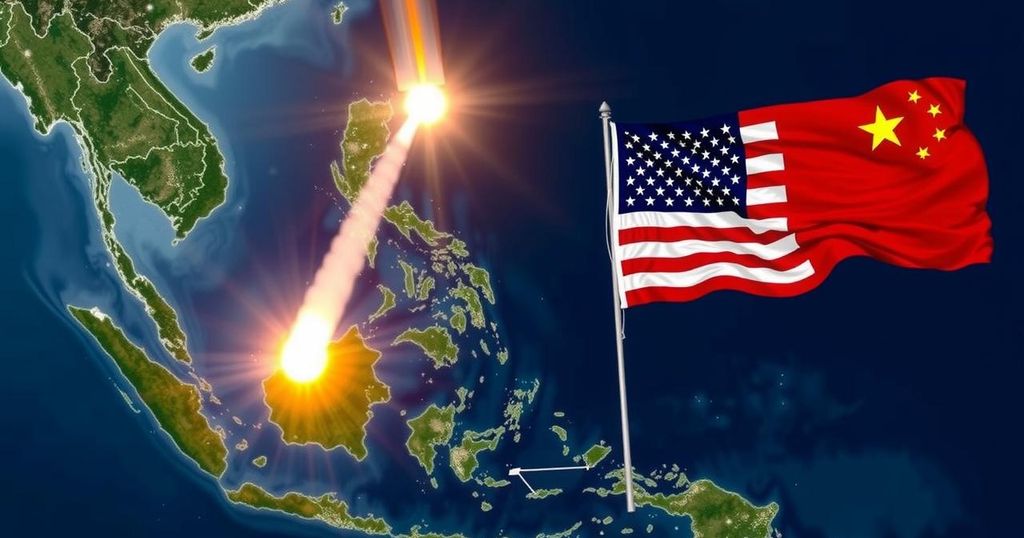Politics
ASIA, ASSOCIATED PRESS, BEIJING, CHINA, CHINESE FOREIGN MINISTRY, DEFENSE, GILBERT, GILBERTO TEODORO, JAPAN, LUZON, MANILA, MEXICO, MILITARY, MUTUAL DEFENSE TREATY, NEWSWEEK, NORTH AMERICA, PHILIPPINE, PHILIPPINES, SOUTH CHINA SEA, TAIWAN, TERRITORIAL DISPUTES, U. S, U. S. ARMY, U. S. MILITARY, UNITED STATES, US, US-PHILIPPINES RELATIONS, WASHINGTON, WU, WU QIAN
Dante Raeburn
China Issues Warning to Philippines Over U.S. Missile Deployment
China has cautioned the Philippines against deploying a U.S. missile system, stating it could spark conflicts in the South China Sea. The warning follows consideration by the Philippines to acquire the Typhon missile system from the U.S., which has led to heightened military tensions in the region and elicited responses from both China and Russia regarding possible retaliatory actions.
China has issued a renewed warning to the Philippines regarding the potential deployment of a United States missile system, referring to it as a significant escalation in the South China Sea conflict. This warning comes in light of Philippine Defense Secretary Gilberto Teodoro’s recent comments on considering the acquisition of the Mid-Range Capability missile system from the U.S., which has raised tensions in the region. During an official press briefing, Senior Colonel Wu Qian, a representative of the Chinese Defense Ministry, expressed that the presence of U.S. military weaponry invariably leads to heightened conflict risks and calls for immediate withdrawal of such systems from the Philippines.
The U.S. Army had previously stationed a Typhon launcher in the Philippines for training purposes, which is capable of deploying Tomahawk cruise missiles and Standard Missiles with considerable ranges. The planned temporary deployment has now turned into an indefinite arrangement, allowing for ongoing military collaboration between the U.S. and the Philippines. This development is set against the broader context of security tensions involving China and the U.S. in the region, especially surrounding the self-governed Taiwan, which China claims as a territory.
The discussions around the missile system have drawn attention not only from China but also from Russia, with Russian officials warning that similar U.S. deployments in Asia may prompt a military response from Moscow. The geopolitical implications of such military movements play a significant role in the shifting alliances and strategies in the Western Pacific, as both the Philippines and Japan remain critical U.S. allies in constraining Chinese influence in the region. Recent statements from Chinese officials underscore the seriousness with which they view these developments, indicating potential retaliatory measures should the U.S. proceed with the missile deployment.
The growing military presence of the United States in Southeast Asia, particularly in the Philippines, is a response to escalating tensions in the region, primarily emanating from China’s assertive territorial claims in the South China Sea. The Philippines has ongoing territorial disputes with China and has sought closer military ties with the U.S. to bolster its defense capabilities. The U.S. military’s deployment of advanced missile systems is viewed by China as a provocative move that heightens the risk of conflict in an already volatile area. China’s warnings reflect its concerns about U.S. military influence in its vicinity and the potential for increased military confrontations in the region.
In summary, China’s warning to the Philippines regarding the potential deployment of U.S. missile systems highlights the escalating military tensions in the South China Sea. The Philippine government is deliberating on strengthening its defense with U.S. missile technology, which China perceives as an aggressive maneuver, potentially exacerbating conflicts in the region. The reactions from both China and Russia emphasize the intricate geopolitical landscape in the Western Pacific, underscoring ongoing strategic rivalries among the U.S., China, and their respective allies.
Original Source: www.newsweek.com








Post Comment